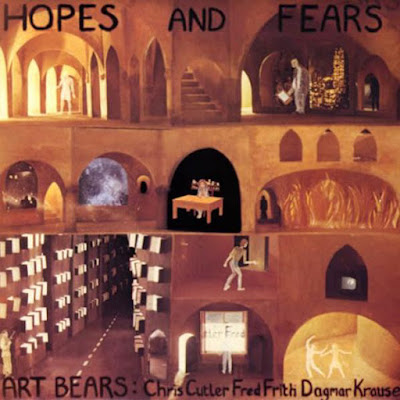1978
Hopes And Fears
Áhá - Palace Courtyard
01. On Suicide
02. The Dividing Line
03. Joan
04. Maze
05. In Two Minds
Mer - Irrigated Land
06. Terrain
07. The Tube
08. The Dance
09. Pirate Song
10. Labyrinth
11. Riddle
12. Moeris, Dancing
13. Piers
14. Silence
Bonus Tracks
15. The Riddle
16. First Things First
17. March From The Dance
18. The Hermit
Fred Frith / guitars, violin, viola, piano, harmonium, xylophone, bass
Chris Cutler / drums, electric drums, percussives, noise
Dagmar Krause / singing
Guest musicians:
Lindsay Cooper / bassoon, oboe, soprano sax, recorder
Tim Hodgkinson / organ, clarinet, piano
Georgie Born / bass, cello, voice
01. On Suicide
02. The Dividing Line
03. Joan
04. Maze
05. In Two Minds
Mer - Irrigated Land
06. Terrain
07. The Tube
08. The Dance
09. Pirate Song
10. Labyrinth
11. Riddle
12. Moeris, Dancing
13. Piers
14. Silence
Bonus Tracks
15. The Riddle
16. First Things First
17. March From The Dance
18. The Hermit
Fred Frith / guitars, violin, viola, piano, harmonium, xylophone, bass
Chris Cutler / drums, electric drums, percussives, noise
Dagmar Krause / singing
Guest musicians:
Lindsay Cooper / bassoon, oboe, soprano sax, recorder
Tim Hodgkinson / organ, clarinet, piano
Georgie Born / bass, cello, voice
Art Bears' debut album emerged from the same sessions that produced the brilliant Henry Cow album Western Culture, and indeed the remaining members of the last Henry Cow line up are present as guest musicians and occasional co-writers. The album was, and remains, a remarkable achievement, and had a phenomenal impact when it was first released, but with hindsight it was the first step towards an artistic vision that would only be fully realised on subsequent albums.
A number of common elements recurred throughout Art Bears discography: Chris Cutler's lyrics were indebted to Brecht and informed by an interest in the middle ages, mythology and left wing politics; Frith's music reflected his interest in assorted arcane folk traditions, which would also influence his solo career; and Dagmar interpreted their vision like an updated Lotte Lenya. The move towards relatively normal songs took some people by surprise, but on his website Cutler stresses that he and Frith had both started out in straightforward rock groups, so the desire to play short songs had always been there.
lbum opens with a short version of the Brecht/Eisler song On Suicide, which Dagmar declaims over a stark cello/bassoon/clarinet arrangement. This lasts for less than 2 minutes, but effectively sets the stage for the band's subsequent career. The Dividing Line brings in the full band and a theme that is to recur throughout the album (it originated from the backing track of the Cooper composition Riddle being played at half speed) and is another sparse, Brechtian song. Joan is introduced by a searing Frith electric guitar motif and retells the story of Joan of Arc, and is one of the pieces which would not have sounded out of place on a Henry Cow album. The most remarkable song closed side 1 of the vinyl original, and at over 8 minutes long In 2 Minds was the longest track Art Bears recorded. The lyrics were inspired by Scottish psychiatrist R.D. Laing's book Sanity, Madness and the Family and the music alternates between a slowly strummed and slightly out of tune acoustic guitar and a rock out which recalls The Who - it's midway between Pinball Wizard and Won't Get Fooled Again, and all the more effective for being so unexpected.
The second half of the album continues in a similar vein, including two uptempo instrumental tracks (to be strictly accurate, one contains a wordless vocal by Dagmar) which would sit nicely on the Frith solo albums Gravity or Speechless - hummable, danceable but still 100% Rock In Opposition. Some of the lengthy instrumental breaks also sound like a RIO take on traditional country dancing tunes, such as the lengthy coda to The Dance - Frith playing a mournful jig over Cutler's strict tempo snare and bass drum, with Dagmar slowly chanting a counter melody in the background. Elsewhere, The Pirate Song is sung to an imaginative piano accompinament played and composed by Tim Hodgkinson, while the subsequent Labyrinth (Daedalus Lamenting) pushes Cutler's hyperactive drumming to the fore. The album closes with a brief piece about the Medieaval English poem Piers the Ploughman, with an arrangement which recalls On Suicide and which also points to the direction of Winter Songs, their next album.
Compared with what was to follow, Hopes and Fears is something of a flawed gem. There are pieces which sound more like Henry Cow or Frith solo, and the presence of additional musicians makes some of the arrangements sound comparatively cluttered (all future Art Bears releases featured only the core trio). Taken in isolation, it's one of the key albums of the Rock In Opposition movement and shows that, although Henry Cow had ground to a halt, the key members were only just beginning to realise their potential as composers and performers. Highly recommended.

ReplyDeletehttp://www.filefactory.com/file/jzpvd2uvvmi/8090.rar